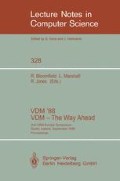Abstract
Different calculi of partial or three-valued predicates have been used and studied by several authors in the context of software specification, development and validation. This paper offers a critical survey on the development of three-valued logics based on such calculi.
In the first part of the paper we review two three-valued predicate calculi, based on, respectively, McCarthy's and Kleene's propositional connectives and quantifiers, and point out that in a three-valued logic one should distinguish between two notions of validity: strong validity (always true) and weak validity (never false). We define in model-theoretic terms a number of consequence relations for three-valued logics. Each of them is determined by the choice of the underlying predicate calculus and of the weak or strong validity of axioms and of theorems. We discuss mutual relationships between consequence relations defined in such a way and study some of their basic properties.
The second part of the paper is devoted to the development of a formal deductive system of inference rules for a three-valued logic. We use the method of semantic tableaux (slightly modified to deal with three-valued formulas) to develop a Gentzenstyle system of inference rules for deriving valid sequents, which in turn is used to obtain a sound and complete system of natural deduction rules. We have chosen to study the consequence relation determined by the predicate calculus with McCarthy's propositional connectives and Kleene's quantifiers and by the strong interpretation of both axioms and theorems. Although we find this choice appropriate for applications in the area of software specification, verification and development, we regard this logic merely as an example and use it to present some general techniques of developing a sequent calculus and a natural deduction system for a three-valued logic.
Non-(tertium non datur)
Preview
Unable to display preview. Download preview PDF.
12 References
Simple consequence relations. Report ECS-LFCS-87-30, Laboratory for Foundations of Computer Science, University of Edinburgh, June 1987.
Barringer, H., Cheng, J.H., Jones, C.B. A logic covering undefinedness in program proofs. Acta Informatica 21(1984), 251–269.
Beth, E.W. The Foundations of Mathematics. North-Holland 1959.
Blikle, A. On the development of correct specified programs. IEEE Transactions on Software Engineering SE-7 (1981), 251–169.
Blikle, A. The clean termination of iterative programs. Acta Informatica 16(1981), 199–217.
Blikle, A. MetaSoft Primer: Towards a Metalanguage for Applied Denotational Semantics. LNCS vol.288, Springer-Verlag 1987.
Blikle, A. A calculus of three-valued predicates for software specification and validation. in: Proc. VDM-Europe Symposium 1988, LNCS, Springer-Verlag 1988, this volume.
Cheng, J.H. A logic for partial functions. PhD thesis, Department of Computer Science, University of Manchester 1986; Report UMCS-86-7-1.
Goguen, J.A. Abstract errors for abstract data types. in: Proc. IFIP Working Conference on the Formal Description of Programming Concepts, St.Andrews 1977 (E.Neuhold, ed.), North-Holland 1978.
Hoogewijs, A. On a formalization of the non-definedness notion. Zeitschrift f. Math. Logik u. Grundlagen d. Math. 25(1979), 213–221.
Hoogewijs, A. A partial predicate calculus in a two-valued logic. Zeitschrift f. Math. Logik u. Grundlagen d. Math. 29(1983), 239–243.
Hoogewijs, A. Partial-predicate logic in computer science. Acta Informatica 24(1987), 381–393.
Jones, C.B. Systematic Software Development Using VDM. Prentice-Hall 1986.
Jones, C.B. VDM proof obligations and their justification. in: VDM — A Formal Method at Work, Proc. VDM-Europe Symposium 1987, LNCS vol.252, Springer-Verlag 1987, 260–286.
Kleene, S.C. On notation for ordinal numbers. Journal of Symbolic Logic 3(1938), 150–155.
Kleene, S.C. Introduction to Mathematics. North Holland 1952, then republished in 1957, 59, 62, 64, 71.
Koletsos, G. Sequent calculus and partial logic. MSc thesis, The University of Manchester 1976.
McCarthy, J. A basis for a mathematical theory of computation. Western Joint Computer Conference, May 1961; then published in: Computer Programming and Formal Systems (P.Braffort, D.Hirshberg, eds.) North-Holland 1967, 33–70.
Owe, O. An approach to program reasoning based on a first-order logic for partial functions. Research Report 89, Institute of Informatics, University of Oslo, February 1985.
Prawitz, D. Natural Deduction. Almquist & Wiksell, Stockholm 1965.
Author information
Authors and Affiliations
Editor information
Rights and permissions
Copyright information
© 1988 Springer-Verlag Berlin Heidelberg
About this paper
Cite this paper
Konikowska, B., Tarlecki, A., Blikle, A. (1988). A three-valued logic for software specification and validation. In: Bloomfield, R.E., Marshall, L.S., Jones, R.B. (eds) VDM '88 VDM — The Way Ahead. VDM 1988. Lecture Notes in Computer Science, vol 328. Springer, Berlin, Heidelberg. https://doi.org/10.1007/3-540-50214-9_19
Download citation
DOI: https://doi.org/10.1007/3-540-50214-9_19
Published:
Publisher Name: Springer, Berlin, Heidelberg
Print ISBN: 978-3-540-50214-2
Online ISBN: 978-3-540-45955-2
eBook Packages: Springer Book Archive

